Recent work by Marisa Abrajano and Zoltan Hajnal shows that views on immigration drives American voting behavior. But is the same occurring in other countries?
A number of west European (i.e. not formerly Communist) countries have anti-immigrant parties. Known as radical right, right-wing populist, and extreme right, these parties vary quite a lot in their levels of xenophobia. But they have in common their desire to decrease immigration and hostility to to the European Union.
Has their support increased? The following graph shows total support for radical right parties by year for all parliamentary elections since 2000 in 13 countries:
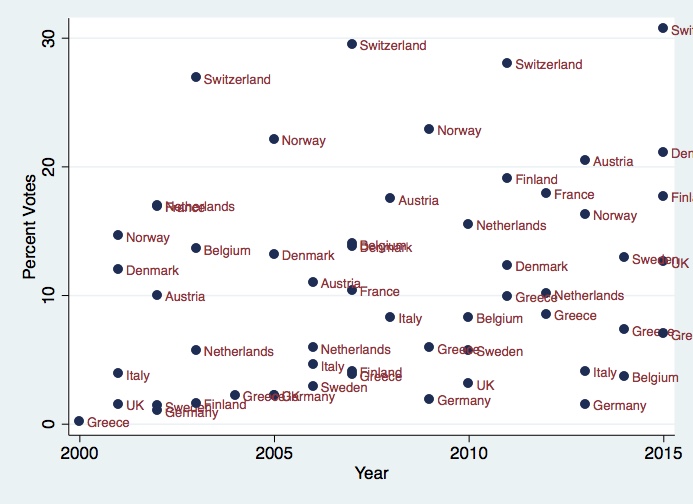 The point cloud in the graph does not immediately suggest growth in support in recent years. Statistical models, however, paint a different picture:
The point cloud in the graph does not immediately suggest growth in support in recent years. Statistical models, however, paint a different picture:
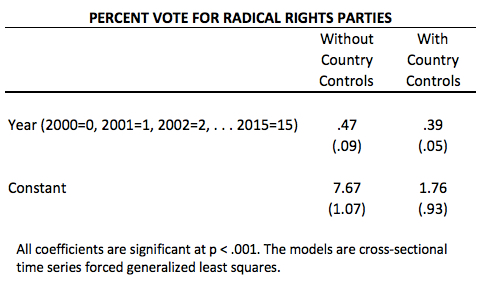 Both models assess simply whether support for radical right parties increased with time. The second model also includes controls for each of the 13 countries.
Both models assess simply whether support for radical right parties increased with time. The second model also includes controls for each of the 13 countries.
The two models indicate that support for anti-immigrant radical right parties has grown. The model with country controls shows that their vote has increased by an estimated 0.39% per year from 2000 through 2015. (Models not shown here indicate that growth in their support is not concentrated in the most recent five years.)
Why do the models indicate a steady increase in support for anti-immigrant parties even though no pattern emerges in the point cloud? A close examination of the data from individual countries reveals the answer. The following table shows support for radical right parties in parliamentary elections held since 2000:
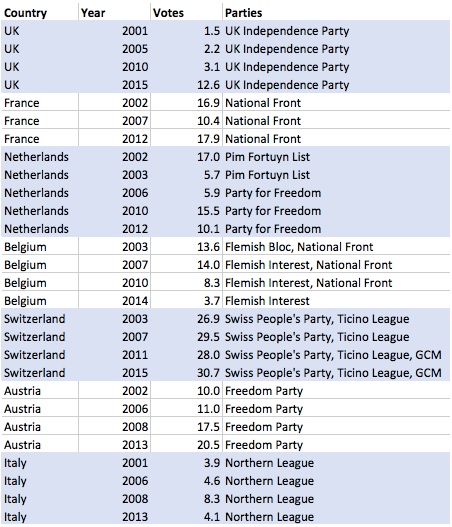
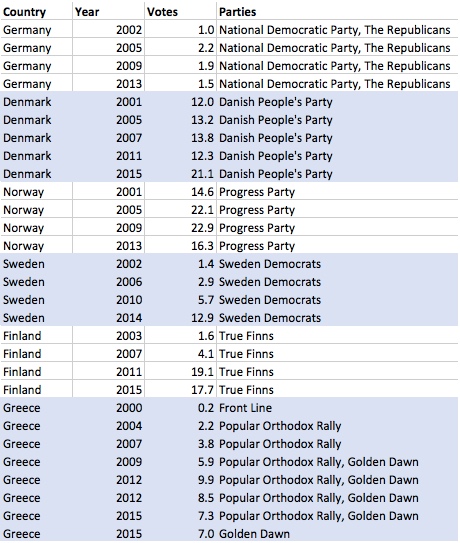 In several countries, anti-immigrant parties have gained substantial support since 2000. The True Finns received just 1.6% support in 2003 but 17.7% in elections held earlier this year. Extreme right Greek parties, such as neo-Nazi Golden Dawn, garnered 7-10% of the vote in recent elections, higher than the 0-6% they won prior to 2010. In Austria, the Freedom Party won 20.5% support in 2013–more than double their support in 2002.
In several countries, anti-immigrant parties have gained substantial support since 2000. The True Finns received just 1.6% support in 2003 but 17.7% in elections held earlier this year. Extreme right Greek parties, such as neo-Nazi Golden Dawn, garnered 7-10% of the vote in recent elections, higher than the 0-6% they won prior to 2010. In Austria, the Freedom Party won 20.5% support in 2013–more than double their support in 2002.
In the UK, Sweden and Denmark, support for anti-immigrant parties jumped substantially in elections held this year. The UK Independence Party (UKIP) won a 12.3% of the vote and the Sweden Democrats won 12.9% in this year’s elections. The Danish People’s Party earned 21.1% of the vote, much higher than their previous record of 13.8%.
Other countries have seen smaller changes, or less consistent changes, so the countries where the radical right has gained strength drive the results in the statistical model. Only Belgium has seen support for the radical right decline as the small National Front has disappeared and Flemish Interest has lost support to the New Flemish Alliance–nationalist but not radical right.
Are these trends likely to continue? Excluding countries that held elections this year (and Germany), polling in eight countries says yes. Taking the latest three polls from these countries suggests that average radical right support will jump from 12.2% to 20.3% in the next election. (Note: French results are from presidential rather than legislative elections.)
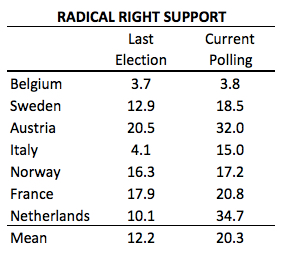 In short, the ongoing refugee crisis in Europe appears to be driving up support for anti-immigrant parties. The intensified battles over immigration in the U.S. reflect similar debates occurring in many other democracies.
In short, the ongoing refugee crisis in Europe appears to be driving up support for anti-immigrant parties. The intensified battles over immigration in the U.S. reflect similar debates occurring in many other democracies.
In future posts, I hope to bring the lens back to Maryland and the U.S. on the politics of immigration.
